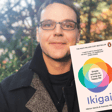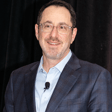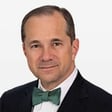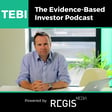Become a Creator today!Start creating today - Share your story with the world!
Start for free
00:00:00
00:00:01

Ep 11: ETFs – good and bad?
The subject of this week’s TEBI Podcast is ETFs, or exchange-traded funds.
ETFs have been all the rage in recent years, soaring in popularity all over the world. In the US, a total of $124 billion has poured into ETFs in the first two months of 2017 — the the most aggressive start to a year since the industry was founded 24 years ago.
I’ve been talking to Nizam Hamid, European ETF strategist at WisdomTree, to get his perspective on a range of issues:
What are the advantages of using ETFs?
With so many products now available, how do investors find the ones they really need?
How can the industry play a part in educating consumers about the importance of investing for the long-term?
And is the ETF become the go-to investment vehicle of the future?
Transcript
Introduction and Collaboration with Regis Media
00:00:05
Speaker
Hello and welcome to the latest TEBI podcast, brought to you by the evidence-based investor in conjunction with Regis Media, connecting advisors with clients. I'm Robin Powell and this is episode 11.
Growth of ETFs in the US and Europe
00:00:21
Speaker
This week we're looking at Exchange Traded Funds or ETFs. As everyone knows, ETFs have grown in popularity very fast in recent years.
00:00:30
Speaker
Until recently, the focus has been on the US market, which still accounts for more than 70% of global ETF assets. But ETFs are taking off in other regions too. In Europe, for example, assets have grown tenfold over the last ten years. Assets globally now stand at a staggering 3.2 trillion US dollars.
Interview with Nizam Hamid on ETF Advantages
00:00:55
Speaker
I've been speaking to Nizam Hamid, European ETF strategist at Wisdom Tree in London. I started by asking him to explain what he thinks are the main advantages of using ETFs. I think the number one advantage that clients have become increasingly aware about is the whole cost side, the whole cost equation.
00:01:16
Speaker
something which has been recently highlighted by the FCA has become increasingly important. Clients have been sort of understanding it over the years, but I think FCA's focus on a total cost of ownership with fund has really brought that to the forefront in people's minds. And so an ETF is very transparent. The TR is essentially all you pay. You have spreads on exchange. You may pay a brokerage cost, but
00:01:35
Speaker
it's very easy to understand the costs within an ETF, whereas as we've seen the costs within mutual funds are not just the TR, there's lots of ongoing charges, the charges aren't particularly well disclosed and I think that's the battle that mutual funds now face compared to the transparency of ETFs.
Wisdom Tree's Role in Smart Beta Strategies
00:01:52
Speaker
Wisdom Tree describes itself as the only publicly traded asset manager exclusively focused on the ETF industry. But what I ask Nizam, other than the fact that it's an ETF specialist, is the company's niche.
00:02:07
Speaker
So Wisdom Tree was founded in the US in 2006 after the sort of great tech bubble and wanted to bring something new and different to the market so it created fundamentally awaited indices. In fact we were the pioneers of what today is called smart beta as in non-pure market cap indices and since 2014 we've had a range of usage ETFs in Europe making those same types of strategies available to investors. So the core Wisdom Tree is to
00:02:32
Speaker
give you access to innovative investment solutions which are entirely rules driven and different from pure market cap.
Risks of Factor-Based Investing
00:02:40
Speaker
In podcast episode 9, I asked Larry Suedro about the danger that factor-based investing is becoming too popular. What I asked Nizam was his view. Might factors start to lose their performance premium the more popular they become? Indeed, might we even be seeing the making of a bubble?
00:03:01
Speaker
I think it does depend on the weighting methodologies used. So I think one of the lessons we will ultimately learn is that not all smart beta ETFs are built the same. There are lots of different methodologies and it's really important for people to understand what's behind them. So if we take the way we weight our indices at WisdomTree, we weight our indices by the size in absolute terms of the cash dividends paid by companies.
00:03:23
Speaker
what that means is a large company paying large absolute dividends will have a high weight in the index that means it's typically quite a large company so you're not as prone to the bubble effect that you might have if for example you took a dividend yield type of index
00:03:38
Speaker
and weighted distorts by the dividend yield, at that point you may end up with small cap companies, you're weighting them by an extremely high yield which might be artificial, and that's out of keeping with perhaps the absolute size of the company in the real
Wisdom Tree's Approach to Index Building
00:03:51
Speaker
world. So you have other methodologies, you've got low volatility methodologies where
00:03:56
Speaker
some of the weights of the stocks in that index are very significantly out of kilter with the weight of that stock from a market cap perspective. So we build indices where we believe there's capacity. I think one of the interesting things that we do at Wisdom Tree is when we build an index,
00:04:11
Speaker
we always build it with a liquidity screening and a size screening because we only build indices where we know we want to build an investable product, which is very different from say MSCI or FTSE, Russell or S&P, where you're building indices to capture different market themes, different market flavors. So you're more, it's a much more academic approach of building a benchmark when it is building an investable index.
00:04:33
Speaker
I'll be honest, I'm in two minds about ETFs. In themselves, there's nothing wrong with them. As Nizam says, they're low cost and transparent. The problem, as always, is that the interests of the product providers and consumers are often misaligned.
Educating Investors and the UK ETF Forum
00:04:50
Speaker
The asset management industry has seen how popular ETFs are, and so it keeps bringing out new and ever more obscure ones. It's something apparently that concerns Wisdom Tree as well as me.
00:05:03
Speaker
I think the concern that we have is at the educational level with investors. So we think it's really important. We spend a lot of time and money and effort on educating the end clients about what's going on in terms of ETFs and what they should understand or what they should look for. In fact, Wisdom Tree is one of the founding members of the UK ETF Forum, really designed when we go out on the road and educate financial advisors and wealth managers about
00:05:26
Speaker
not just what an ETF is, but what's behind the ETF, what type of index are you tracking, how you can include it in your portfolio. But you're right, as you get into these niches of niches of different offerings, it's really important for people to understand that. I think the good news is that with an ETF, no matter how niche it is, there's full transparency as what's in that ETF. So that's a good thing. But you're right, people do need to be educated as to how to work with them in an optimal way to build their portfolios.
00:05:52
Speaker
We're going to take a short break there. In a moment, we'll discuss what I believe to be an even bigger problem for ETF investors. First, though, here's a message from our sponsor, Regis Media.
00:06:06
Speaker
Hi, Sam Lewis here from Regis Media. We help advisors around the world to attract, retain and educate clients. We know we can deliver results, but don't just take our word for it. Here's Sam Instone, CEO of AES International, a wealth management firm based in Dubai.
00:06:23
Speaker
I think the impact of the Regis Media videos has been very positive on our organisation because it tells the story which we aspire to tell to all of our clients which have been the basic principles of good investment. They first and foremost understand the purpose of why we exist and what we're trying to do in order to help clients but the quality of what they do and the service that they have provided has also been excellent. To find out more visit RegisMedia.com
00:06:54
Speaker
Welcome back to the TEBI podcast from the evidence-based investor.
Misuse and Trading of ETFs
00:06:59
Speaker
I've been talking to Nizam Hamid, European ETF strategist at Wisdomtree. As I was saying before the break, ETFs have much to recommend them. On the downside, though, there are way too many to choose from. They're often too esoteric, and some are far more expensive than others.
00:07:19
Speaker
But for me, the biggest drawback of all is that investors tend to misuse them. For the vast majority of us, the fact that ETFs can be traded intraday really shouldn't be a reason for using them. Investors should be buying and holding, but they're over-trading, buying and selling ETFs like stocks. Here's Nizam again. The majority of investors that we speak to, especially in the European space, are financial advisors and wealth managers.
00:07:47
Speaker
And because we aren't doing pure market cap, they understand that our strategies are designed to give them better risk-adjusted long-term returns. So they are, as you say, they're not designed for the buy it at 9 o'clock, sell at 11, wait for some U.S. figures and sort of trade it between 3 and half past. They understand that. They understand it if they're looking at
00:08:07
Speaker
Equity income in the UK that's to build wealth in a portfolio if they are looking at high income strategies in Europe or small cap strategies Those aren't very short-term trading things you want to use So they get that because it is different from pure market cap and we stress the fact But you know a lot of our structures might have a value tilt They'll go through a market cycle where markets particularly bullish really might underperform but they normally get back that output under performance when markets come back down and have a correction and
00:08:35
Speaker
Or, you know, depending on the market cycle, the macro view, some of those defensive strategies can actually work very well. So, for example, in an incredibly low interest rate environment as we have today, people can buy European equity stocks with a yield of over five and a half percent. You don't have to go to emerging markets to get that sort of deal. So, if you want to build an equity income portfolio where you're focusing on
00:08:58
Speaker
that income rather than absolute return or total return is delivered. You can buy strategies that do that. So it is important that people understand effectively why they're owning particular strategies. We make that abundantly clear. A lot of our strategies we show, they've been live in the US since 2006. So it's really important. We have a live track record uniquely in SmartBeat for over 10 years. So people can actually see over the long run how those long run returns
ETFs During Market Crashes
00:09:25
Speaker
have evolved. And that's critical as well.
00:09:27
Speaker
Partly because of overtrading, some commentators have claimed that ETFs are potentially dangerous. When markets last crashed in 2008, ETF assets were a tiny fraction of what they are today. So is Wisdom Tree worried about what might happen in the event of another crash?
00:09:48
Speaker
Apparently not. So a couple of things to think of. There's more money in passive index funds than there is in ETFs, not only in Europe, but also globally. And ETFs are always as liquid as the underlying security. So for people who make a market on exchange, when they look at say a 3100 ETF or wisdom tree UK equity income ETF, they're not looking at the liquidity of the ETF, they're looking at how they can sell, what price they can sell, the securities underlying that ETF.
00:10:13
Speaker
So it's always down to the securities underlying ETF. So it would probably be fair to say that in a small cap fund, if smaller cap stocks suddenly became less liquid as a whole, that ETF would take on that same lack of liquidity. But in large cap stocks, it would be as liquid as the underlying. So I think that's
00:10:32
Speaker
That's a mechanism people really need to be aware of. The backup mechanism here is the liquidity provided by market makers and authorised participants. For them, the liquidity they provide is dependent on the liquidity of the underlying stocks, but also the liquidity of equivalent instruments they could use, if they could hedge themselves in futures.
00:10:51
Speaker
they'd be able to make you a more accurate price in that ETF. So it's a very well connected system. I think perhaps where you've seen some of the concerns might be in markets that trade OTC and that sort of fixed income. Fixed income is a market which is slightly different. But in the equity space, we don't have any concerns. We think that liquidity is very, it's very transparent.
00:11:10
Speaker
Everything's on exchange. The ETF trades on exchange. The equities trade on exchange. The liquidity there is very clear for everyone to see.
Future Growth of ETFs and Smart Beta
00:11:17
Speaker
Time for one final question. Will the rapid growth of exchange traded funds continue? Is the ETF the go-to investment product of the future? I think it has set itself on an incredible growth path.
00:11:31
Speaker
The smart beta part of that is growing at an even greater pace than the ordinary market cap-related solutions. And I think we're entering some very interesting macroeconomic times which will make people look for solutions that fit their portfolios better. And the transparency, both in terms of the strategy and the costs that you have within an ETF, suggests that they can deliver the right products for the right people in these fairly uncertain times.
00:11:55
Speaker
Ah, uncertain times. The industry loves to talk about uncertain times, as if there's something new. Of course, the best way to deal with uncertainty is to embrace it and to diversify your portfolio widely. Used properly, ETFs do allow investors to capture market returns at low cost.
00:12:15
Speaker
And that brings us to the end of another Tebbe podcast. Thank you to Nizam Hamid for that interview and to our sponsor Regis Media. If you're a financial advisor and you want to find out how Regis Media can help you to attract, retain, and educate your clients, check out the website at RegisMedia.com. That's RegisMedia.com. Until next time, from me, Robin Powell, goodbye.
















